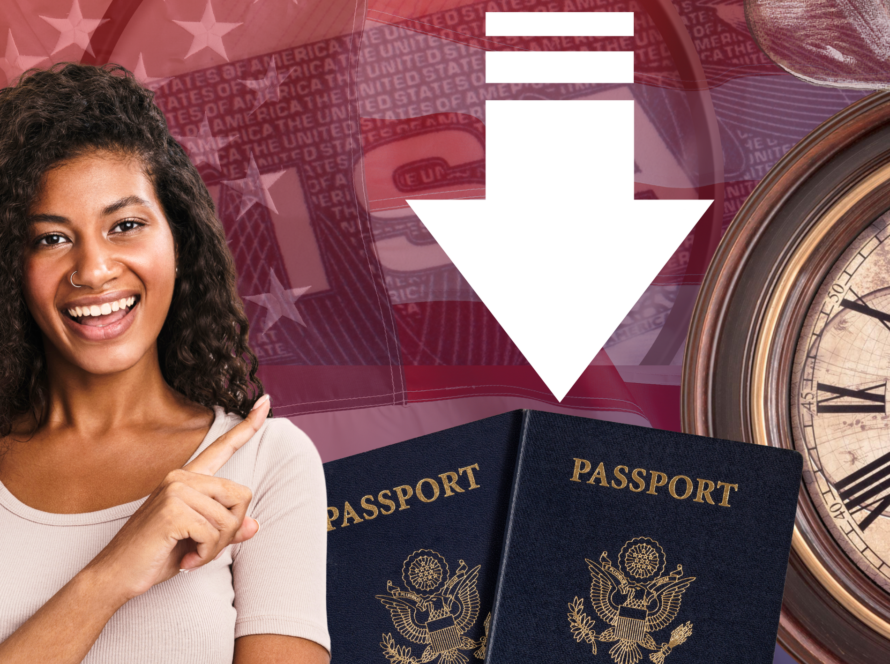
The EB1A visa could be your ticket to a U.S. green card without needing a job offer or employer sponsorship.
But there’s more: not only does the EB1A give you permanent residency, it also qualifies for premium processing, which means you could receive a decision on your petition in as little as 15 days.
Let’s break down exactly what the EB1A visa is, who qualifies, and why it’s one of the most desirable employment-based green card options available today.
What Is the EB1A Visa?
Often called the “Einstein visa,” this category is reserved for individuals who have achieved national or international acclaim and are recognized as leaders in their profession.
This includes professionals working in:
- Sciences
- Arts
- Education
- Business
- Athletics
What sets the EB1A apart is the high standard for eligibility. USCIS defines extraordinary ability as being among “the small percentage who have risen to the very top of their field.”
You’ll need strong evidence to back this up — such as major industry awards, published material about your work, high salary compared to peers, or other accomplishments that show sustained national or international recognition.
Unlike other employment-based green cards, the EB1A allows you to self-petition. This means you don’t need an employer to sponsor you or prove there are no qualified U.S. workers for your position (a process called the Program Review Management Process aka PERM). You can apply on your own, making this a powerful option for independent professionals, freelancers, entrepreneurs, researchers, and more.
What Are the Key Benefits of the EB1A Visa?
The EB1A visa offers several major advantages over other employment-based visa categories. Here’s why it’s such a popular choice among top-tier professionals:
1. No Job Offer or Employer Sponsorship Required
Most employment-based green card applications require a U.S. employer to offer you a job and go through the labor certification process. This can be time-consuming and restrictive. With the EB1A, there’s no need for a job offer or Labor Certification. You can file your petition independently, which gives you more control and flexibility over your immigration journey.
2. It’s a Direct Path to a Green Card
The EB1A is an immigrant visa, which means it directly leads to a U.S. green card. You won’t be stuck on a temporary work visa like H-1B or O-1, wondering about renewals or sponsorship. Once approved, you and your eligible family members (spouse and unmarried children under 21) can become lawful permanent residents of the United States.
3. Eligible for Premium Processing (15-Day Review)
One of the biggest time-saving perks of the EB1A visa is that it qualifies for premium processing. For an additional fee (currently $2,805), you can request USCIS to review your Form I-140 petition within 15 calendar days.
This expedited review only applies to the I-140 petition stage. It does not speed up the adjustment of status (I-485) or consular green card processing. However, it still significantly reduces the overall wait time compared to regular processing.
4. Priority in Green Card Allocation
The EB1 category is the highest preference employment-based category, visa numbers are often current for most countries — making the EB1A one of the fastest immigration options for professionals who qualify.
5. How Long Does EB1A Processing Take?
Here’s what to expect when it comes to EB1A processing time:
- Regular processing: Typically takes 8 to 15 months for the I-140 petition, depending on the USCIS service center and workload.
- Premium processing: Guarantees a decision on the I-140 within 15 calendar days.
- Adjustment of Status (I-485) or consular processing: Adds another 6 to 12 months, depending on your location and visa availability.
Keep in mind, while premium processing speeds up the I-140 stage, it does not fast-track the green card issuance itself. However, it can still save you significant time in your overall green card journey.
What Are the EB1A Visa Requirements?
To get an EB1A visa, you must prove three core things to USCIS:
- You have extraordinary ability in science, art, business, education, or athletics
- You’re coming to the U.S. to keep working in your field
- Your work will benefit the U.S. in a meaningful way
One Major Award May Be Enough
If you’ve won a top-tier international award like: Nobel Prize, Olympic medal, Grammy, or an Oscar — that alone could be enough to get your EB1A approved. These awards are considered sufficient proof of extraordinary ability
Don’t have one of these? No problem. Most people qualify by meeting 3 of 10 other criteria.
No Major Award? Meet 3 Out of 10 Criteria Instead
For those without a major international award, the EB1A visa still remains within reach. USCIS offers 10 evidentiary criteria — and you only need to satisfy at least three of them. Here’s the full list of acceptable forms of evidence:
- Awards or prizes (even if they’re lesser-known)
- Membership in exclusive industry associations
- Articles or news coverage about you
- Judging the work of others in your field
- Original work that’s made a major impact
- Published scholarly articles
- Public displays of your work (exhibitions, shows, etc.)
- Key role in a top organization
- High salary compared to others in your field
- Commercial success (like box office sales or record sales)
The more compelling evidence you provide, the better your chances of approval.
What Counts as a “High Salary” for EB1A?
When applying under the “high salary” criterion, USCIS doesn’t look for a fixed dollar amount. Instead, your earnings must stand out relative to others in your field, considering:
- Geographic location
- Industry standards
- Level of experience
For example, if the average salary in your field is $120,000 and you earn $200,000, you may qualify under this category—especially if you can back it up with:
- Official salary reports (e.g., from U.S. Bureau of Labor Statistics or Glassdoor)
- Tax documents
- Pay stubs
- Employment contracts or offer letters
The key is to show that your income is significantly higher than your peers — proving you’re in demand because of your extraordinary ability.
What If None of the Criteria Fit Your Profession?
USCIS understands that not every field fits neatly into all 10 criteria. They allow for comparable evidence if a specific criterion doesn’t apply to your area of expertise.
For instance:
- A celebrity chef may not have record sales like a musician, but if they’ve sold a best-selling cookbook, that could count as commercial success.
- A tech innovator might not have traditional scholarly publications but may have patents and keynote speeches that demonstrate original contributions and industry leadership.
In these cases, it’s crucial to explain why a standard criterion doesn’t apply to your profession and to justify why your alternative evidence should qualify.
How to Prove You’d Keep Working in Your Field While in the U.S
It’s not enough to prove that you’re exceptional—you also have to show that you’re coming to the U.S. to keep using your extraordinary talent.
This part is actually pretty simple. You can prove this with any of the following:
- A letter from a potential employer in your field
- A contract showing you’ve already agreed to do work in the U.S.
- A personal statement where you explain your plans to continue working in your area of expertise
You don’t need a job offer to qualify. You just need to show that you plan to keep doing the kind of work you’re known for.
How to Show You’ll Benefit the United States
The final box to check for the EB1A visa is showing that your presence will benefit the U.S. in a meaningful way.
This part is usually assumed. If you’re coming to work in your field of extraordinary ability, USCIS already expects that your contributions will help the country in some way.
To satisfy this requirement, you can simply include a short statement explaining how your work will benefit the U.S. That’s usually enough.
Frequently Asked Questions About EB1A Visa
How Much Does an EB1A Visa Cost?
Here’s a quick summary of the main government fees for the EB1A visa:
- Form I-140: $1015 (including $300 asylum fees)
- Premium Processing (optional): $2,805 (as of October 2024)
- Adjustment of Status (I-485, inside the U.S.): $1,440
- Visa Application Fee (consular processing abroad): $325
These fees don’t include legal, translation, or document preparation costs. Also, plan for additional fees if applying with family members.
Fees can change over time, so it’s a good idea to check the official USCIS website for the most up-to-date information.
What Documents Do You Need for the EB1A Visa?
Every EB1A case is different, depending on your achievements, industry, and experience. But here’s a general list of what you’ll likely need to prepare:
- Your resume or CV
- Passport copies (for you and any family members applying with you)
- Proof of your extraordinary ability (this could be awards, media coverage, publication copies, pay stubs showing high income, citations, etc.)
- Letters of recommendation from respected experts in your field
- Evidence of planned work in the U.S. (such as a job offer, freelance contract, or a written statement about your upcoming projects)
Strong documentation is key to approval, so it’s best to gather as much supporting evidence as possible — and work with an experienced immigration consultant who can help present your case clearly.
What Is the Process for Getting an EB1A Visa?
Here’s a simple step-by-step overview:
- Check Eligibility: Confirm you meet EB1A extraordinary ability requirements.
- Gather Evidence: Collect proof—a major award or at least 3 of the 10 USCIS criteria.
- File Form I-140: Submit your petition with evidence; optional premium processing speeds up review (15 days).
- USCIS Review: Conduct the verification and evaluation of your case
- Apply for Green Card: If approved, file I-485 (inside U.S.) or use consular processing (abroad), including a biometrics appointment.
Receive Green Card: Once approved, you and eligible family members get permanent residency; total process takes 6–18 months depending on processing speed and visa availability.
Summary
The EB1A visa is an excellent option for people who truly stand out in their fields.
“Extraordinary ability” means you’re among the very best in your area and have earned national or international recognition for your work.
You prove this either by winning a major award or by meeting at least three of the specific USCIS criteria we covered in this article.Now that you understand what the EB1A visa is and how to qualify, you’re better equipped to decide if it’s the right path for you.
Ready to Move Forward with Your EB1A Application?
You don’t have to figure it all out on your own. At My Green Card Story, we specialize in guiding EB1A applicants with expert, personalized support every step of the way.
Book your consultation today and take the next step with confidence.
For official guidelines and eligibility details, visit the USCIS website.
Let’s make Your EB2-NIW & EB1A journey a success! Stay connected with us! Follow My Green Card Story on all our socials for the latest updates, tips, and inspiring success stories. Got questions? We’re here to help!



